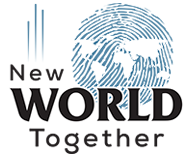New World Together – Fostering Independent Transdisciplinary Research to uncover and address the roots of the Metacrisis.
With New World Together, we have embarked on an extraordinary journey to unravel the intricate web of challenges humanity faces. Our approach knows no disciplinary boundaries. We draw wisdom from an array of fields – environmental science, history, sociology, psychology, anthropology, biology, economy, theology, and philosophy, combining the best of all knowledge to generate breakthrough insights that allow us to understand and overcome our global challenges.
What have we discovered after years of research?
The metacrisis we face results from deeply ingrained, mostly unconscious, human behavioral patterns. These patterns are deep-rooted in inherited primal survival mechanisms, which once ensured our existence but are becoming increasingly unsustainable and dangerous amidst exponential technological proliferation.
These primal survival mechanisms, often mistaken for unchangeable human nature, are perpetuated by ingrained false beliefs, limiting fears, and unresolved traumas that are not only personal but also collective and passed from generation to generation below our level of awareness.
Our unwavering dedication, motivated by the understanding of the implications of these discoveries, has enabled us to identify these hidden roots and develop strategies to address them. By bringing consciousness where there was none before we can increase our self-awareness, consciously change our behaviors, and take our individual and collective destiny back into our hands.
“Until we make the collective unconscious conscious, it will drive our civilization toward collapse and we will call it unchangeable human nature.”
Benjamin Casteillo – Founder of New World Together
Access a 4-page summary of our groundbreaking findings and their implications by clicking here.
Please note that our research has been conducted independently. We are actively seeking collaborations with universities and other pertinent institutions to facilitate the publication and propagation of our findings. Do not hesitate to reach us!
